これまでの研究の概要
ゲーム人工知能
概要
AlphaGoなどのゲーム人工知能は人間よりも強いので,それら相手に我々がゲームをしてもすぐ負けてしまい楽しくないでしょう.そこで,相手に合わせて自分の強さを変更するゲーム人工知能AlphaDDAを開発しました.AlphaDDAはAlphaZeroをベースにしており,AlphaZeroの強さを持ちながら手加減が可能です.AlphaDDAは,AlphaZeroがプレイできる様々なゲームに適用可能です.図はAlphDDAがオセロで角を取れるにも関わらず,それを避ける様子です.ソースコードはGitHubで公開中です.
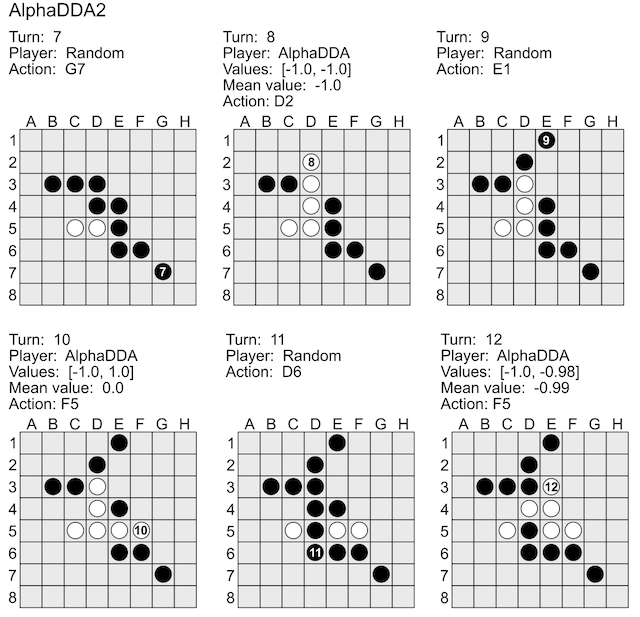
AlphaZeroは、元々一度に一つのゲームしかプレイできない制約がありました。しかし、私は大規模言語モデルなどで使用されるTransformerと呼ばれるニューラルネットワークを応用し、AlphaZeroを改良して複数のゲームを同時にプレイできるようにしたAlphaViTを開発しました。以下の図は、AlphaViTにおいて使用されるニューラルネットワークの構造を示しています。
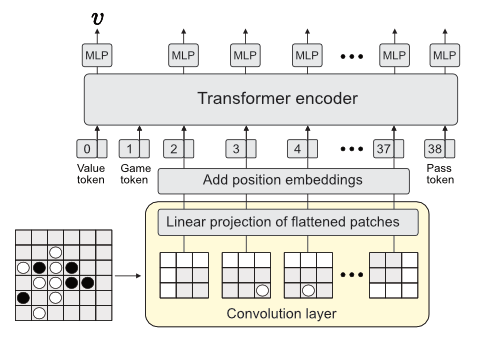
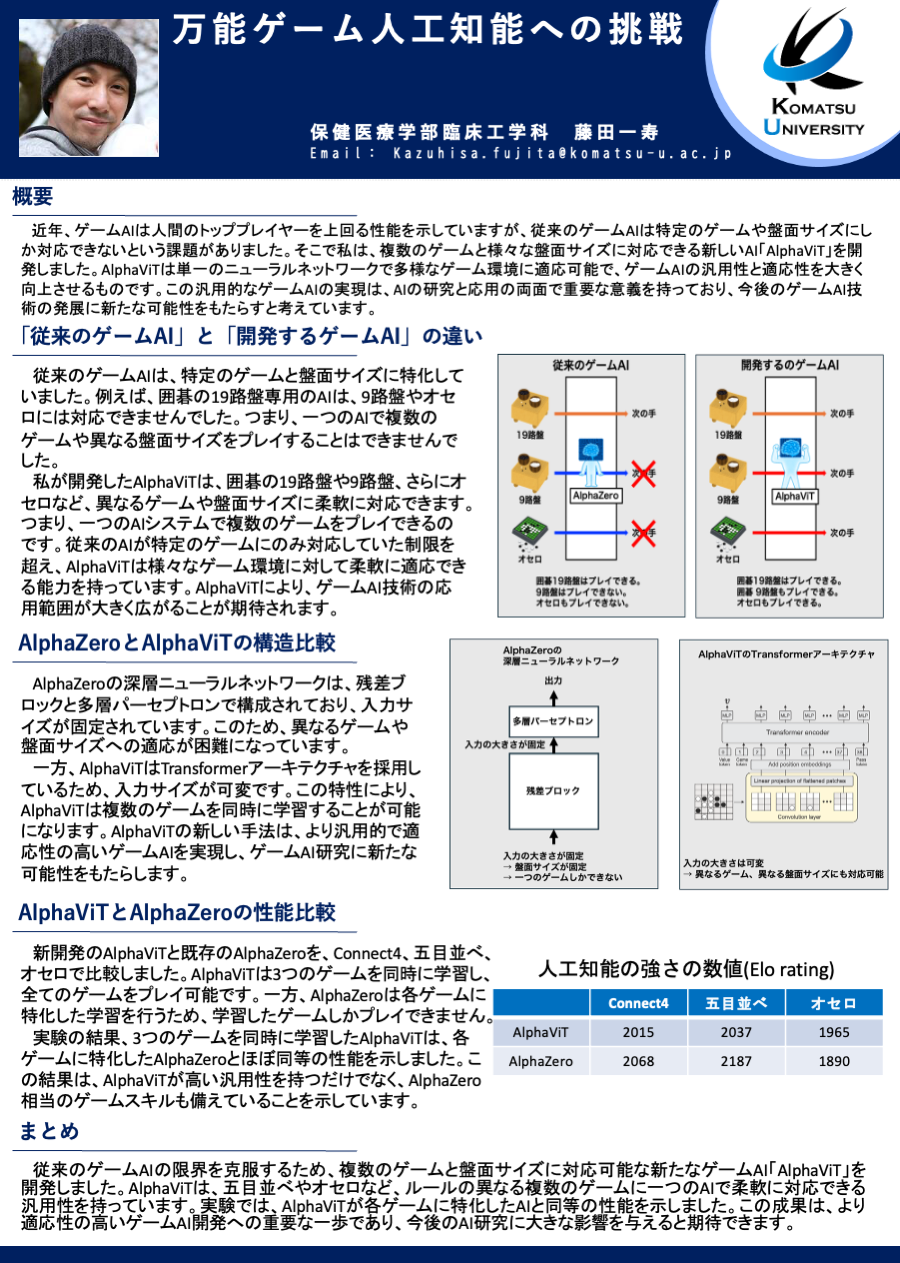
論文
- Kazuhisa Fujita (in press) Flexible game-playing AI with AlphaViT: adapting to multiple games and board sizes. PeerJ Computer Science.
- Kazuhisa Fujita (2022) AlphaDDA: Strategies for Adjusting the Playing Strength of a Fully Trained AlphaZero System to a Suitable Human Training Partner. PeerJ Computer Science, 8, e1123.
ベクトル量子化・クラスタリング手法の開発
概要
この研究では,データ解析やデータ削減に用いられるベクトル量子化手法とクラスタリング手法を幾つか開発してきました.開発してきた手法の一つが,円柱座標で表されるデータに特化した確率モデルベースのクラスタリング手法です (Fujita, 2017).開発した手法を画像の減色に適用したところ,色相に対応した色に分けられることを確認しました (下図).また,ビッグデータ対応のためのクラスタリング手法も開発いたしました (Fujita, 2020; Fujita, 2024).
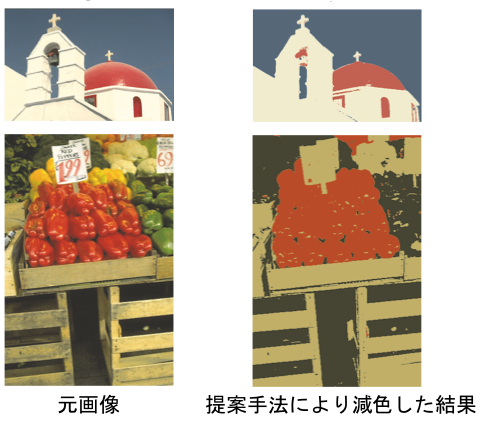
論文
- Kazuhisa Fujita (2024) An efficient and straightforward online quantization method for a data stream through remove-birth updating. PeerJ Computer Science, 10, e1789.
- Kazuhisa Fujita (2023) Characteristics of networks generated by kernel growing neural gas. International Journal of Artificial Intelligence & Applications, 14(5), 25-39.
- Kazuhisa Fujita (2021) Approximate spectral clustering using both reference vectors and topology of the network generated by growing neural gas. PeerJ Computer Science, 7, e679.
- Kazuhisa Fujita (2021) Estimation of the number of clusters on d-dimensional sphere. Artificial Intelligence Research, 10, 57-63.
- Kazuhisa Fujita (2017) A clustering method for data in cylindrical coordinates. Mathematical Problems in Engineering, 2017, Article ID 3696850, 1-11.
GPUを用いたスパイキングニューラルネットワークの高速化
概要
脳活動を理解するためには,生物学的な実験だけではなくコンピュータシミュレーションが有効です.しかし,大規模な脳のシミュレーションは膨大な量の計算をする必要があります.本研究ではGPUによる脳のシミュレーションの高速化に挑戦しています.その結果市販のグラフィックボードを用いてもCPUより遥かに高速に計算できることを明らかにしました.
論文
- Kazuhisa Fujita, Shun Okuno, and Yoshiki Kashimori (2018) Evaluation of the computational efficacy in GPU-accelerated simulations of spiking neurons. Computing, 100, 907–926.
- Shun Okuno, Kazuhisa Fujita, and Yoshiki Kashimori (2017) Computational efficacy of GPGPU-accelerated simulation for various neuron models. Lecture Notes in Computer Science, 10638, 802-809.
- Kazuhisa Fujita and Yoshiki Kashimori (2016) GPU-Accelerated Simulations of an Electric Stimulus and Neural Activities in Electrolocation. Lecture Notes in Computer Science, 9950, 213-220.
スパイキングニューラルネットワークのコンピュータシミュレーション
概要
様々な脳の神経ネットワークのモデル化に取り組んできました.
論文
- Kazuhisa Fujita (2011) Modulations of electric organ discharge and representation of the modulations on electroreceptors. Lecture Notes in Computer Science 7064, 251-258.
- Kazuhisa Fujita, Yoshiki Kashimori and Takeshi Kambara (2007) Spatiotemporal burst coding for extracting features of spatiotemporally varying stimuli. Biological Cybernetics 97, 293-305.
- Kazuhisa Fujita, Yoshiki Kashimori, Meihong Zheng and Takeshi Kambara (2006) A role of synchronicity of neural activity based on dynamic plasticity of synapses in encoding spatiotemporal features of electrosensory stimuli, Mathematical Biosciences 201, 113-124.
- Kazuhisa Fujita and Yoshiki Kashimori (2006) Population coding of electrosensory stimulus in receptor network, Neurocomputing 69, 1206-1210.
- Kazuhisa Fujita, Yoshiki Kashimori and Takeshi Kambara (2005) Dynamic population coding for detecting the distance and size of an object in electrolocation, Neurocomputing 65-66, 243-251.
- Kazuhisa Fujita and Yoshiki Kashimori (2005) A neural model for encoding information of object distance and size in electrolocation, Proc. of 12th International Conference on Neural Information Processing/APNN 2005/11, 318-321.
- Kazuhisa Fujita, Yoshiki Kashimori, Meihong Zheng and Takeshi Kambara (2004) A role of burst firings in encoding of spatiotemporally-varying stimulus, Biosystems 76, 21-31.
機械受容器の動力学モデル
概要
皮膚に存在する機械刺激を神経活動に変換する機械受容器は複雑な応答をします.そのメカニズムは十分に分かっていません.本研究では,機械受容器の応答を再現する数理モデルを提案し,複数の時間特性の異なるイオンチャネルにより複雑な応答が生成されることを示しました.上図は機械受容器に与える刺激の大きさ,下図は再現した機械受容器の応答の様子です.
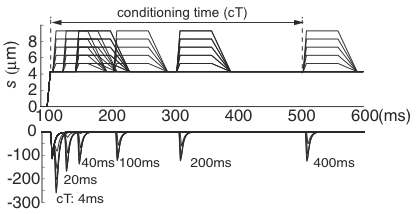
論文
- Kazuhisa Fujita (2014) A model of a rapidly-adapting mechanosensitive current generated by a dorsal root ganglion neuron. Mathematical Biosciences, 252C, 60-66.
有限要素法を用いた電場計算
有限要素法を用い弱電気魚が生成する電場の様子を調べました.図はコンピュータシミュレーションにより求めた弱電気魚が生成した電場の様子です.
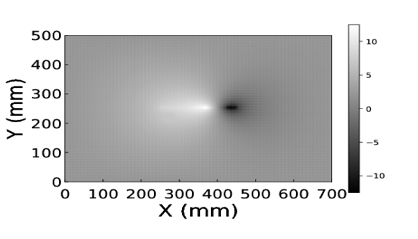
論文
- Kazuhisa Fujita and Yoshiki Kashimori (2019) Representation of object’s shape by multiple electric images in electrolocation. Biological Cybernetics, 113, 239-255.
- Kazuhisa Fujita and Yoshiki Kashimori (2010) Modeling the electric image produced by objects with complex impedance in weakly electric fish. Biological Cybernetics 103, 105-118.
Last Update: 2025/10/31
藤田 一寿
- 所属:公立小松大学保健医療学部臨床工学科准教授
- 連絡先: kazu@spikingneuron.net
- Researchmap
- ORCID
- Docswell(技術資料)
- Speaker Deck(講義資料)
- GitHub(ソースコードなど)
- Qiita(技術メモ)
メニュー
更新履歴
Powered by nanoc